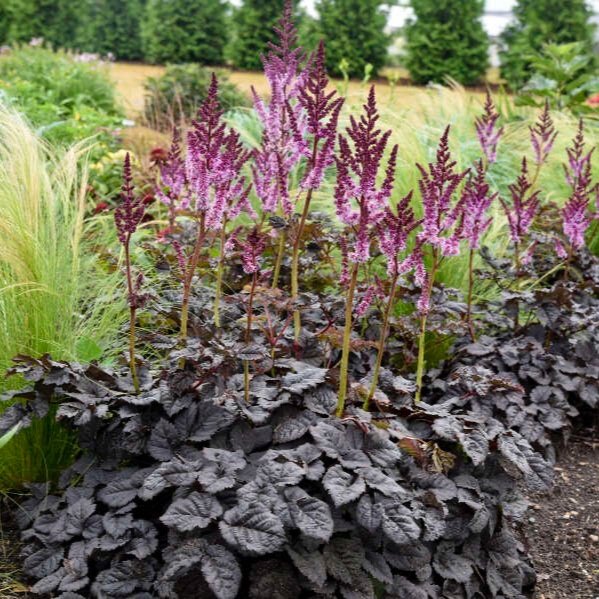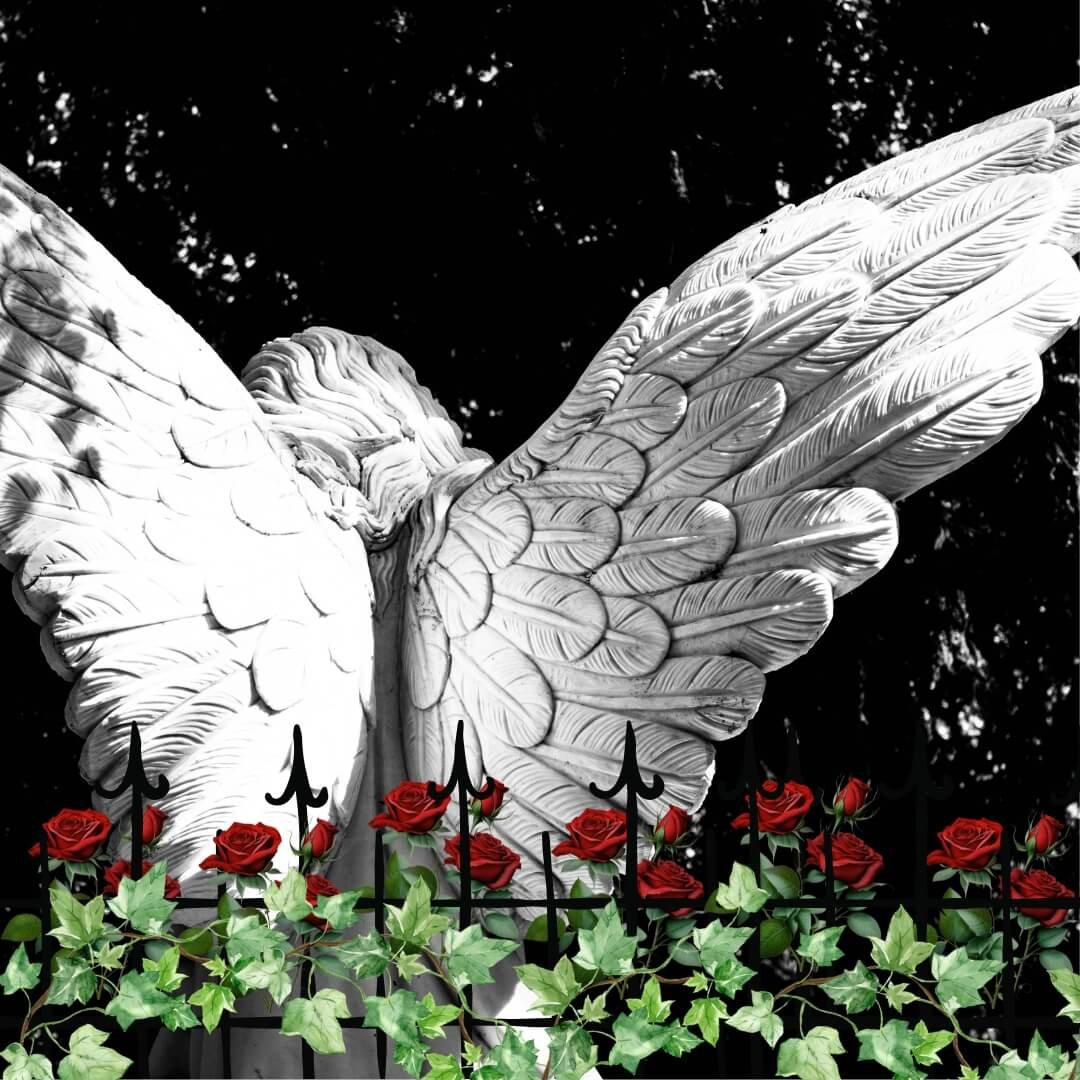10 Striking Garden Plants with Black Leaves
Cover image: Summerific® Cookies and Cream Rose Mallow. Image courtesy of Walters Gardens, Inc.
Discover the Drama of Black Foliage Plants
Add bold contrast and depth to your garden with these ten stunning plants with black leaves.
Want to bring a bold, dramatic flair to your garden? Look no further! This list—complete with photos—features 10 stunning plants with black leaves that add mystery and elegance to any outdoor space.
These black foliage plants are perfect for creating striking landscape designs and unique gardening combinations that turn heads.
Whether you're looking to make a statement or add depth to your landscaping, these plants deliver!
Keep scrolling to explore these beauties, and don’t miss the expert tips at the end on buying, growing, and designing with plants with black leaves in your garden.
Summerific® Cookies and Cream Rose Mallow
Botanical name: Hibiscus ‘Cookies and Cream’
Type: Perennial
Zones: 4 - 9
Light requirements: Full sun
Size: 2.5-3 feet high and 3.5-4 feet wide
Bloom time: Mid to late summer
Attributes: Smaller size than most hibiscus, compact shape, strong stems, large tropical-looking flowers
Summerific® 'Cookies and Cream' Rose Mallow. Image courtesy of Walters Gardens, Inc.
2. Primo® Black Pearl Coral Bells
Botanical name: Heuchera 'Black Pearl'
Type: Perennial
Zones: 4 - 9
Light requirements: Full sun - full shade
Size: 8-10 inches high and 18-20 inches wide
Bloom time: Midsummer
Attributes: Fast growth rate, increased tolerance of heat and humidity, deer resistant
Primo® Black Pearl Coral Bells. Image courtesy of Walters Gardens, Inc.
3. Black Knight Echeveria
Botanical name: Echeveria peacockii 'Black Knight'
Type: Tender perennial
Zones: 9 and above
Light requirements: Full sun - part shade
Size: 1-6 inches high and wide with taller flower spikes
Bloom time: Late summer - early fall
Attributes: Low water requirements, attracts hummingbirds and pollinators. Winter indoors below zone 9.
Black Knight Echeveria. Image courtesy of Ball Horticultural Company.
4. Rock ‘n Grow Back in Black Sedum
Botanical name: Sedum ‘Back in Black’
Type: Perennial
Zones: 3 - 9
Light requirements: Full sun
Size: 20-24 inches high and 26-30 inches wide
Bloom time: Early fall
Attributes: Attracts pollinators, low water requirements, winter interest and food for the birds
Rock ‘n Grow Back in Black Sedum. Image courtesy of Walters Gardens, Inc.
5. BLACK DIAMOND® Crystalline Crape Myrtle
Botanical name: Lagerstroemia indica 'JBG 19020'
Type: Tree
Zones: 6 - 10
Light requirements: Full sun
Size: 12 feet high and 8 feet wide
Bloom time: Midsummer to early fall
Attributes: Abundant white flowers, attracts pollinators, good disease resistance
Black Diamond® Crystalline Crape Myrtle. Image courtesy of PlantHaven International, Inc.
6. Laced Up® Elderberry
Botanical name: Sambucus nigra 'SNR1292'
Type: Shrub
Zones: 4 - 7
Light requirements: Full sun to partial shade
Size: 6-10 feet high and 3-4 feet wide
Bloom time: Early summer
Attributes: Narrow, columnar variety that fits into tight spaces, feathery foliage, easy to grow, deer resistant. Produces berries if you plant a male pollinator like Black Lace® or Black Beauty™ nearby.
Laced Up® Elderberry. Image courtesy of Proven Winners, provenwinners.com
7. Summer Wine® Black Ninebark
Botanical name: Physocarpus opulifolius 'SMNPMS'
Type: Shrub
Zones: 3 - 7
Light requirements: Full sun
Size: 5-6 feet hight and wide
Bloom time: Spring
Attributes: White flower clusters in spring, easy to grow, low maintenance
Summer Wine® Black Ninebark. Image courtesy of Proven Winners, provenwinners.com.
8. Onyx Orange Ornamental Pepper
Botanical name: Capsicum annuum ‘Onyx Orange’
Type: Annual
Light requirements: Full sun
Size: 12 inches high and wide
Special attributes: Shiny black leaves and fruits that change color from black to red to bright orange.
Onyx Orange Ornamental Pepper. Image courtesy of American Takii, Inc. via National Garden Bureau.
9. Eclipse® Bigleaf Hydrangea
Botanical name: Hydrangea macrophylla 'Bailmacseven'
Type: Shrub
Zones: 5 - 9
Light requirements: Morning sun and afternoon shade
Size: 3-5 feet high and wide
Bloom time: Summer
Attributes: Cranberry to amethyst colored flowers, disease resistant, good cut flowers
Eclipse® Bigleaf Hydrangea. Image courtesy of Bailey Nurseries.
10. Sweet Caroline Raven™ Ornamental Sweet Potato Vine
Botanical name: Ipomoea batatas 'NCORNSP-024SCRI'
Type: Annual
Light requirements: Full sun
Size: 6-16 inches high and 20-36 inches wide
Attributes: Excellent heat tolerance, fast-growing and vigorous
Sweet Caroline Raven™ Ornamental Sweet Potato Vine. Image courtesy of Proven Winners, provenwinners.com.
Tips for Buying Plants with Black Leaves
Choosing the right plants with black leaves for your garden starts with smart shopping! Here’s how to make sure you get exactly what you need:
Always purchase using the botanical name – Common names can be confusing and vary based on where you live. The botanical name ensures you’re getting the exact plant you want.
Ask for help if needed – A garden center overflowing with plants can feel overwhelming! Staff members can guide you to the right black foliage plants and answer any questions about your space and growing conditions.
If you're new to gardening – Not sure if your space is right for a plant? Bring photos of your yard to the garden center, and the staff can help you determine if these black-leaved plants are a good choice for your landscape.
Shop in early to mid- spring for the best selection – Many black-leaved varieties are popular and tend to sell out quickly. Because plant supply can be unpredictable, once they’re gone, garden centers may not restock these varieties until the following year, so shop early to avoid disappointment!
By following these tips, you’ll have a better chance of snagging the perfect plants with black leaves before they disappear from the shelves!
Tips for Growing Black Foliage Plants
Set your black foliage plants up for success with these essential growing tips:
Select the right zone. Make sure plants are suitable for your USDA hardiness zone.
Match the plant’s light requirements to your garden’s light conditions. Ensure that your plants thrive by choosing a spot with the correct amount of sunlight or shade.
Full sun plants thrive in 6+ hours of direct sunlight.
Part shade plants need 3–6 hours of sunlight or filtered light.
Full shade plants prefer less than 3 hours of direct sun.
Water newly planted garden plants properly. Keep the soil consistently moist but not soggy to help plants establish a strong root system. Read “How to Water Your Plants” for help with determining your watering strategy.
Monitor drought conditions. Some plants with dark leaves can handle dry spells, while others need extra attention during hot weather. Visit the US Drought Monitor map to see if your area is currently experiencing a drought.
By following these tips, you’ll help your plants with black leaves thrive and keep their bold color all season long!
Design Strategies for Plants with Black Leaves
Incorporating plants with black leaves into your landscape design creates depth, contrast, and drama. Here are some creative ways to use them effectively:
Enhance contrast: Black foliage pops against bright flowers, silvery greens, or golden hues, creating striking visual interest in your garden.
Layer for depth: Position black-leaved plants in front of or behind plants with varied textures and colors to create a dynamic, dimensional effect.
Balance wisely: Too many black leaves can feel heavy, but when used strategically, they add a touch of elegance and mystery to your landscape.
Guide the eye: Placing black foliage plants at intervals along pathways or garden beds creates a natural flow and sense of movement.
Embrace the gothic aesthetic: Pair black foliage plants with deep purple, blood-red, or even white flowers for a hauntingly beautiful goth garden, and pair with goth garden decor.
Use as a focal point: A single bold, black-leaved plant can serve as a dramatic centerpiece in a flower bed or container arrangement.
Mix textures: Combine glossy black foliage with feathery, spiky, or broad-leafed plants for a rich and layered effect.
Create a modern edge: Black-leaved plants in sleek, minimalist containers bring a contemporary feel to patios and entryways.
Play with lighting: Position plants with black leaves where they will catch dappled sunlight or contrast against lighter backgrounds to enhance their impact.















